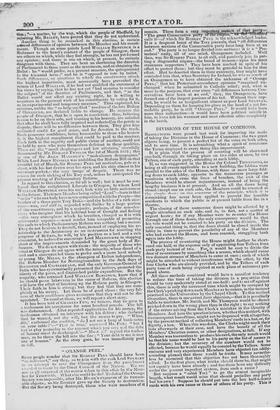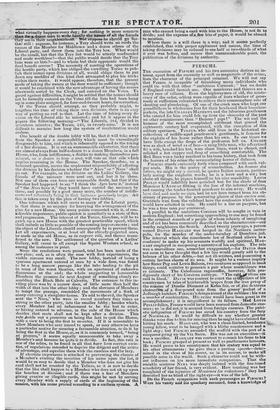DIVISIONS OF THE HOUSE OF COMMONS.
RESOLUTIONS were passed last week for improving the mode of taking the Divisions in the house of Commons ; the two great objects being, to present a perfect list of the votes on both sides, and to save time. It is astonishing what a spirit of resistance the Tories displayed to every thing like improvement.
It is plain that the process of counting will be shortened one-half, through its taking place on two sides at once, by two Tellers, one of each party, attending at each lobby.
If, as was suggested in the House (by Colonel Tncruesoa), as being at all events applicable to a new building, the lobbies were parallel to the sides of the House, with three or more large fold- ing doors to each lobby, opposite to the transverse passages or vomttoria which cross the lines of benches, the exit of the Members would be almost instantaneous, instead of being the lengthy business it is at present. And on all the doors being closed except one on each side, the Members could be counted at sac annr• on the ennvnrcp of the Principle. which it. is . -
astonishing has never teen applied to prevent the horrible accidents to which the public is at present liable from fire in a theatre.
The closing of these numerous doors might be effected by a single attendant on each side, and is, in fact, not a matter of urgent haste; for if any Member were to re-enter the House through one of those doors, the only consequence would be that his vote would not be counted to his party on the division. The only essential thing is, that the doors should be closed inside the lobby in time to prevent the possibility of any of the Members who had entered the House, and been counted, straggling back again into the lobby.
The process of re-entering the House might further be short- ened one half, at the expense only of appointing four Tellers from each party instead of two. For., it would be easy to divide the door of re-entrance by something like a screen, which should cause two distinct streams of Members to enter at once ; each of which might be attended to without interference with the other, by the four Clerks who are already provided, and by the Tellers of each party (one of each being required at each place of entrance) pro- posed above. All these methods combined would have a manifest tendency to reduce the time of taking the division in a pros ortion that would be very moderately stated at one-half : and to set off against this, there is only the increased time which might be occupied by the Clerk's pricking down each Member as he enters, in the manner practised in the Universities by the Chapel Clerk. To this method
altogether, there is one prima _facie objection,—that it is peculiarly liable to mistakes. Mr. Smith and Mr. Thompson would be oftener
pricked down in the wrong place than in the right ; to say nothing of the errors arising from the Clerk's mistakes in the identity of Members. And here the question'arises, whether this method, with its consequent loss oftime, might not be dispensed with altogether,
by the present method of collecting Members' cards in a hat, or, for dignity, a box. When this was done, the Clerks might mark their
lists afterwards at their ease, and have the benefit of all the Members' Christian names, or other designations, at full. If any Member was too careless tc produce his card, the only result would be that his name would be lost to his party on the list of names in the division ; but the accuracy of the numbers would not be affected, because he would equally be counted by the Tellers. Some eminent and very experienced Members have objected (an oddly-
sounding phrase) that there would be tricks. It may neverthe- less be surmised that this objection has not been thoroughly sifted. In the first place, what tricks should there be, that might not equally have been already ; and has there been any difficulty under the present imperfect system, from such a cause ? But suppose a " rabid Tory" to go the utmost imaginable length, what result would arise that should prejudice any party but his own ? Suppose he should put into the box half-a-dozen i cards with his own name or those of others of his party. This is what virtually happens every day ; for nothing is more common than fur a, dozen men to write hastily the names of all the friends "'they see in their neighbritirhoM. Rnt suppose be should go fur- ther still : suppose, for instance, a Tory should write on cards the
names of the Member for Middlesex and a dozen others of the Liberal party, and throw them into the Tory box. What would be the result, but that the Tory list would be utterly confounded and made worthless ?—that the public would decide that the Tory lists were no lists ?—and to whom but their opponents would the final benefit accrue ? The necessity of meeting the operations of the hostile party, which has obliged the unwilling Tories to pub- lish their names upon divisions at all, would oblige them to put down any meddler of this kind that attempted to play his tricks within their ranks. It would appear, therefore, that the present mode of taking the names at the door would be sufficient ; though it would be combined with the new advantage of having the names afterwards sorted by the Clerk, and entered on the Votes. To guard against difficulties, it might be settled that the names should not be formally entered on the Votes till the lists had been hung up in some place assigned, for four-and-twenty hours, for correction. If the Tories should attempt, as they probably might, to lengthen the time of taking their own divisions, there is an easy
way of putting an end to that. Let the time of taking every di- vision on the Liberal side be minuted ; and let it appear in the papers the following morning—" The Liberals, 284, divided in seventeen minutes ; the Tories, 243, in twenty-nine." It is not difficult to surmise how long the system of recalcitration would endure.
One benefit of the double lobby will be, that it will take away from the Speaker a responsibility which must be exceedingly
disagreeable to him, and which is inherently opposed to the taking of a fair division. It is not an unreasonable calculation, that there are almost always from half-a-dozen to a dozen Members, in a full House, who, from indifference, a dislike to making themselves pro- minent, or a desire to keep a seat, will vote on that side which implies remaining in the House. The Speaker, therefore, on a balanced question, incurs the unpleasant responsibility of affecting the division by his decision whether the " Ayes " or " Noes " shall go out. For example, on the division on the Ladies' Gallery, the friends of the measure were sent out, and lost it by three. Not one of them can have any reasonable doubt, but that if the Speaker had happened to say " I think the Ayes have it," instead of " the Noes have it," they would have carried the measure by three, and possibly by a good many more, the number of indiffe- rents nn.l relectente being in that instaisse peculiarly large. All this is taken away by the plan of having two lobbies. One inference which will occur to many of the Liberal party, is that there is no urgency for hurrying the arrangement of the plan for a new House. On many points connected with it, of con- siderable importance, public opinion is manifestly in a state of flux and progression. The interest of the Tories, therefore, will be to patch up a new House with the greatest practicable speed, which shall include as little as possible of the coming improvements ; and the object of the Liberals should consequently be to prevent them. Let all experiments, or at least all the already-projected ones, be made in the old House, as in corpore viii, and thence trans- ferred to the new. The settlement of the question of a Ladies' Gallery, will cccur to all except the Squire Western school, as among the instances in point. Since the resolutions were passed, trial has been made of the new plan; and, as is often the case with first experiments, the visible success was small. The new lobby, instead of being a spacious apartment entered at once by a wide door, was found to be a long narrow passage like the tube leading to the pit in some of the worst theatres, with an apartment of unknown dimensions at the end; the whole suggesting to honourable Members the promise for next August of something closely re- sembling the Black Hole at Calcutta. The entrance to this in- viting place was by a narrow door, of little more than half the width of that into the other lobby ; and the slowness of Members to tempt the passage, resembled the movements of a flock of cheep entering a slaughter-house. To add to the evil, the Speaker sent the " Noes," who were in round numbers four times as strong as the other party, into the smaller lobby ; besides which, every Member had an inducement to be the last to enter, or having entered to advance, in the rule of the House which decides that scats shall not be kept after a division. This rule .holds out a premium on being the last to quit the House, with a view to being the first to re-enter. If it is reasonable to allow Members who may intend to speak, or may otherwise have a particular motive for securing a favourable situation, to do it by being the first in the House, or, as it is commonly termed, " being at prayers," it seems equally unreasonable to take away a Member's seat because lie quits it to divide. In fact, this rule is one of the relics, to be found in all that have been corrupt socie- ties, of regulations intended to deprive the diligent and the active of advantage, and equalize them with the careless and the lazy. If absolute importance is attached to preventing the chance of a Member's evading the insertion of his name upon the list, it would be as easy to decide that a Member who does not give his card shall not be counted by the Tellers, as it is now to decide that the like shall happen to a Member who does not sit up upon the benches at division ; and if there was a fear of Members giving evasive or illegible cards, this might be met by serving every Member with a supply of cards at the beginning of the session, with his name printed-according to a uniform system. A. man who cannot bring a card with him to the House, is not fit to divide; and the expense of a few bits of paper, it would be absurd to mention.
Where there is a will there is a way; and it seems perfectly established, that with proper appliances and means, the time of taking divisions may be reduced to one half or two-thirds of what it over was before, and secure that unsurrenderable point, the publication of the divisions by authority.



























 Previous page
Previous page